Luận án Nghiên cứu xác định tải trọng gió lên nhà cao tầng có kết cấu khung giằng
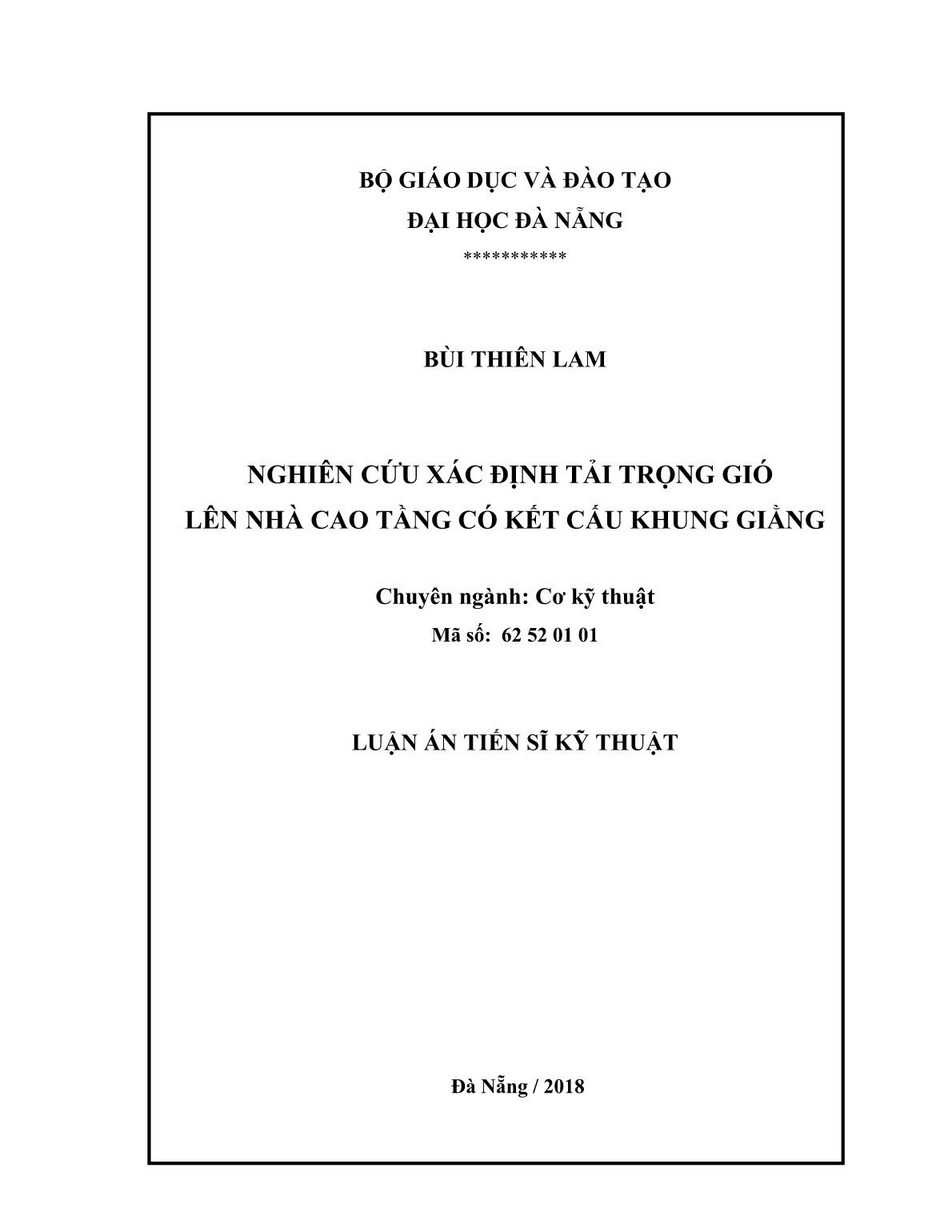
Trang 1
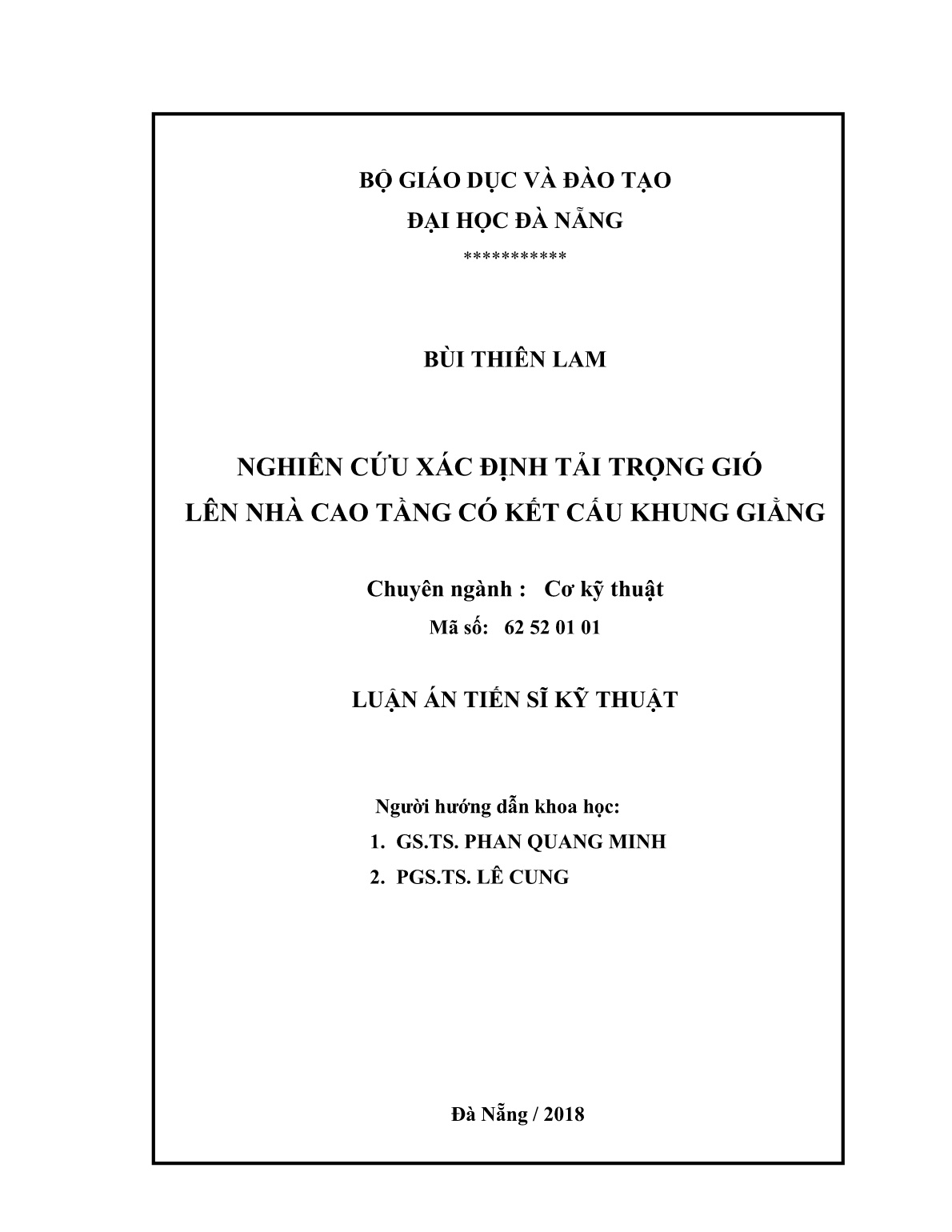
Trang 2
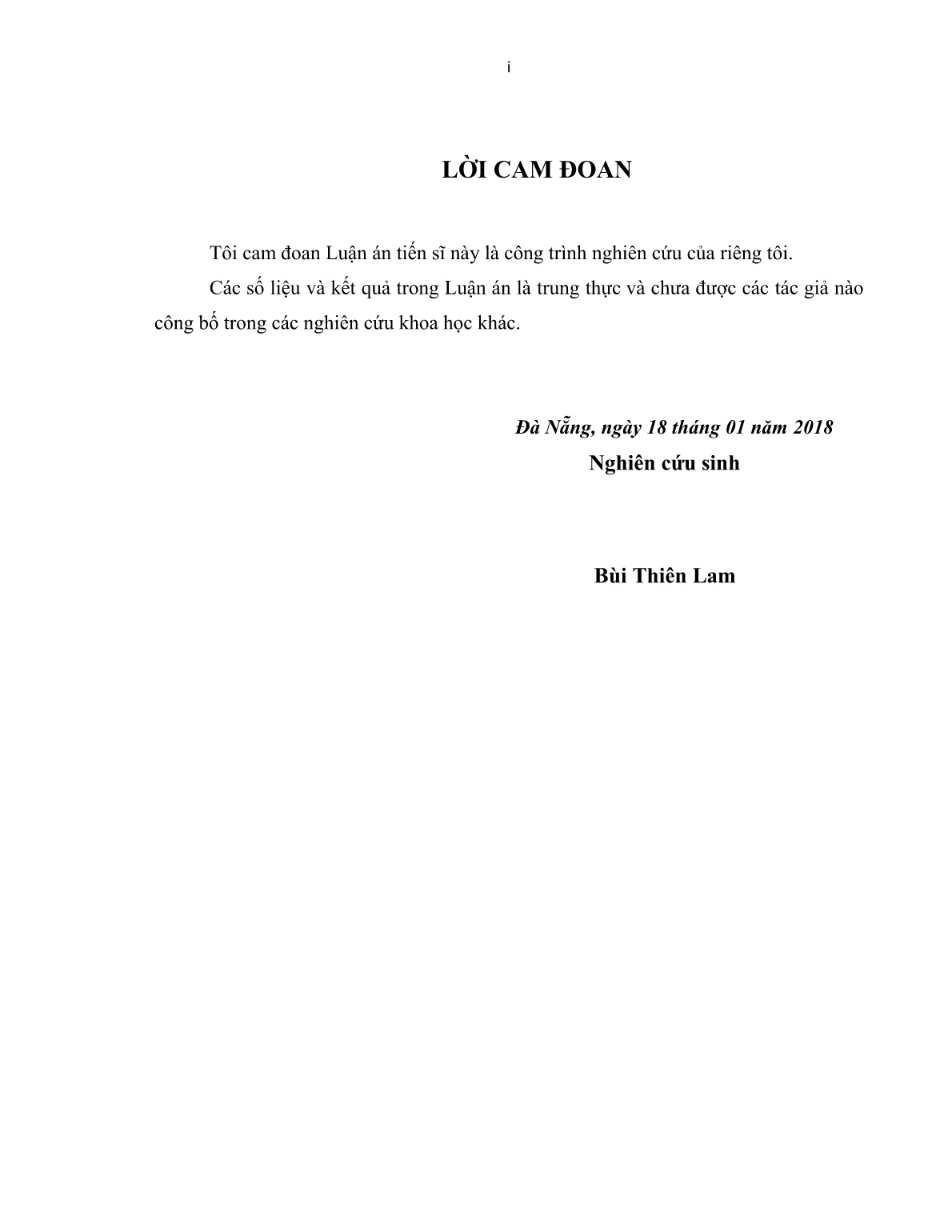
Trang 3
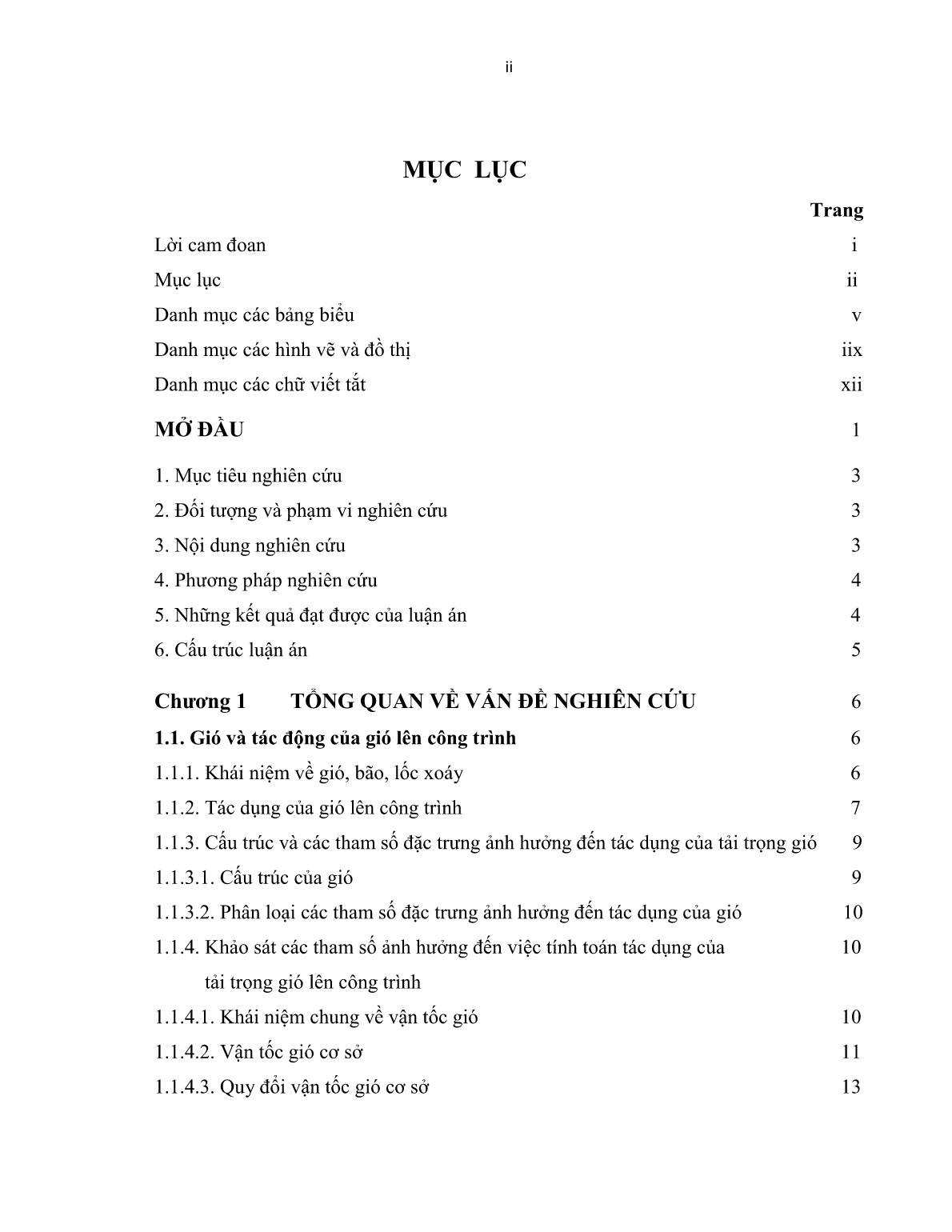
Trang 4
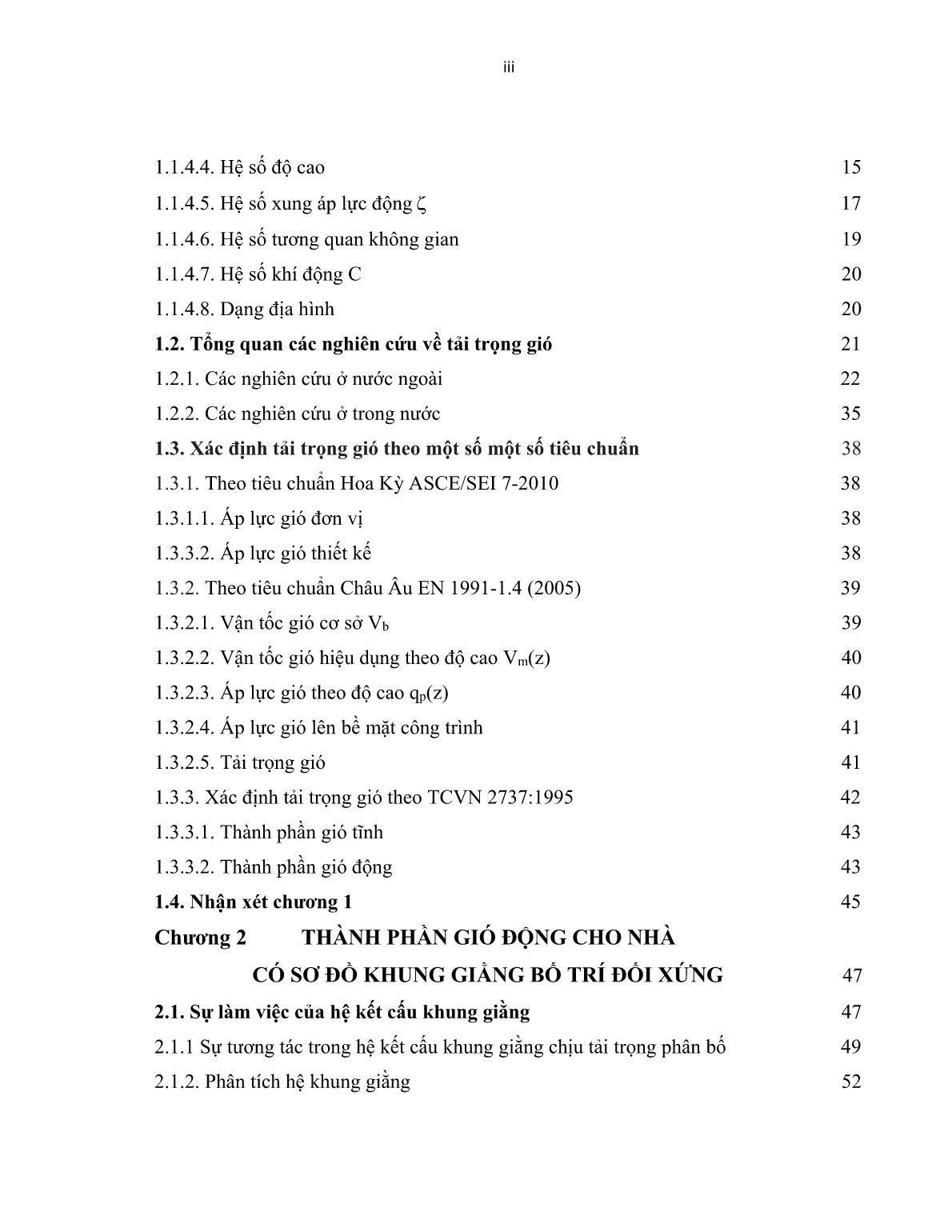
Trang 5
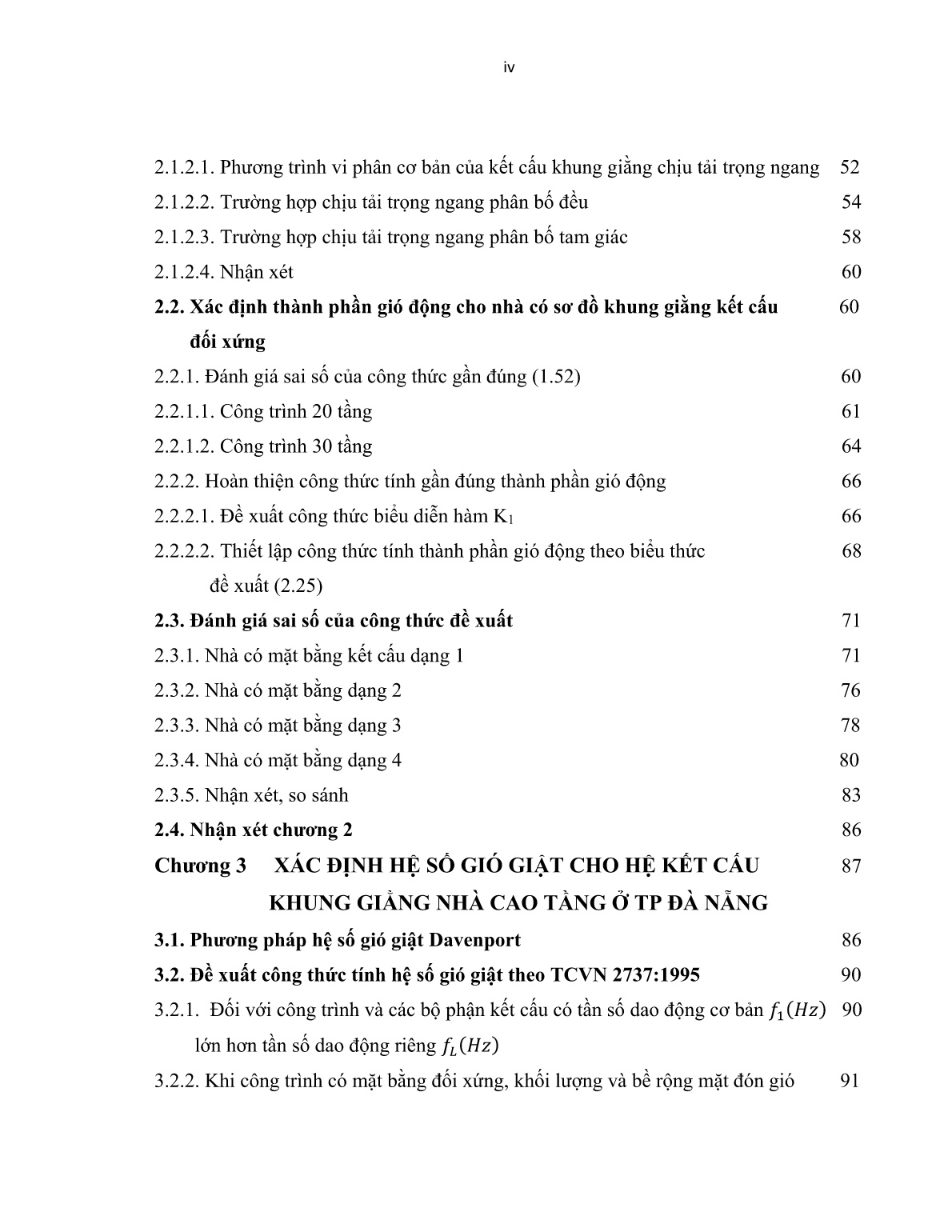
Trang 6
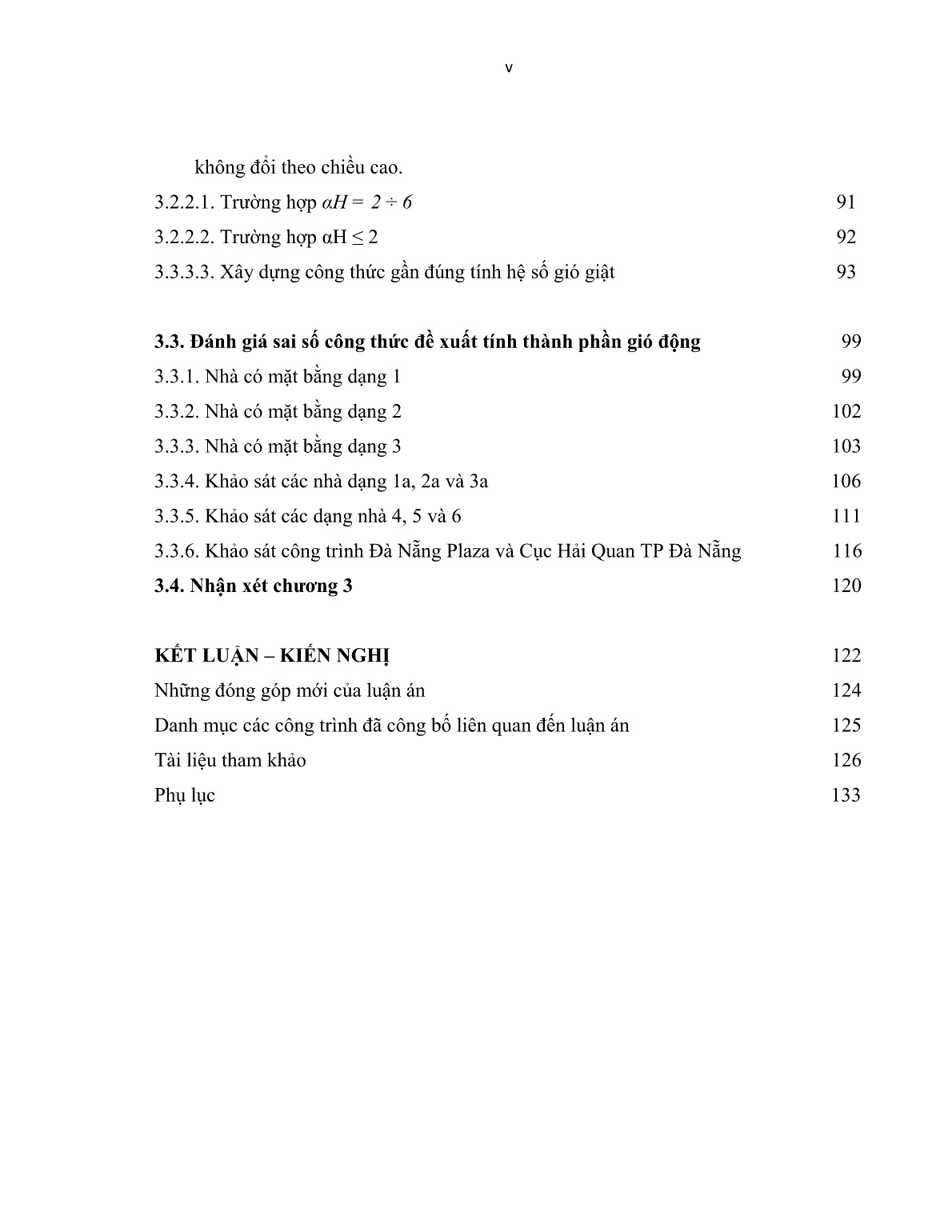
Trang 7
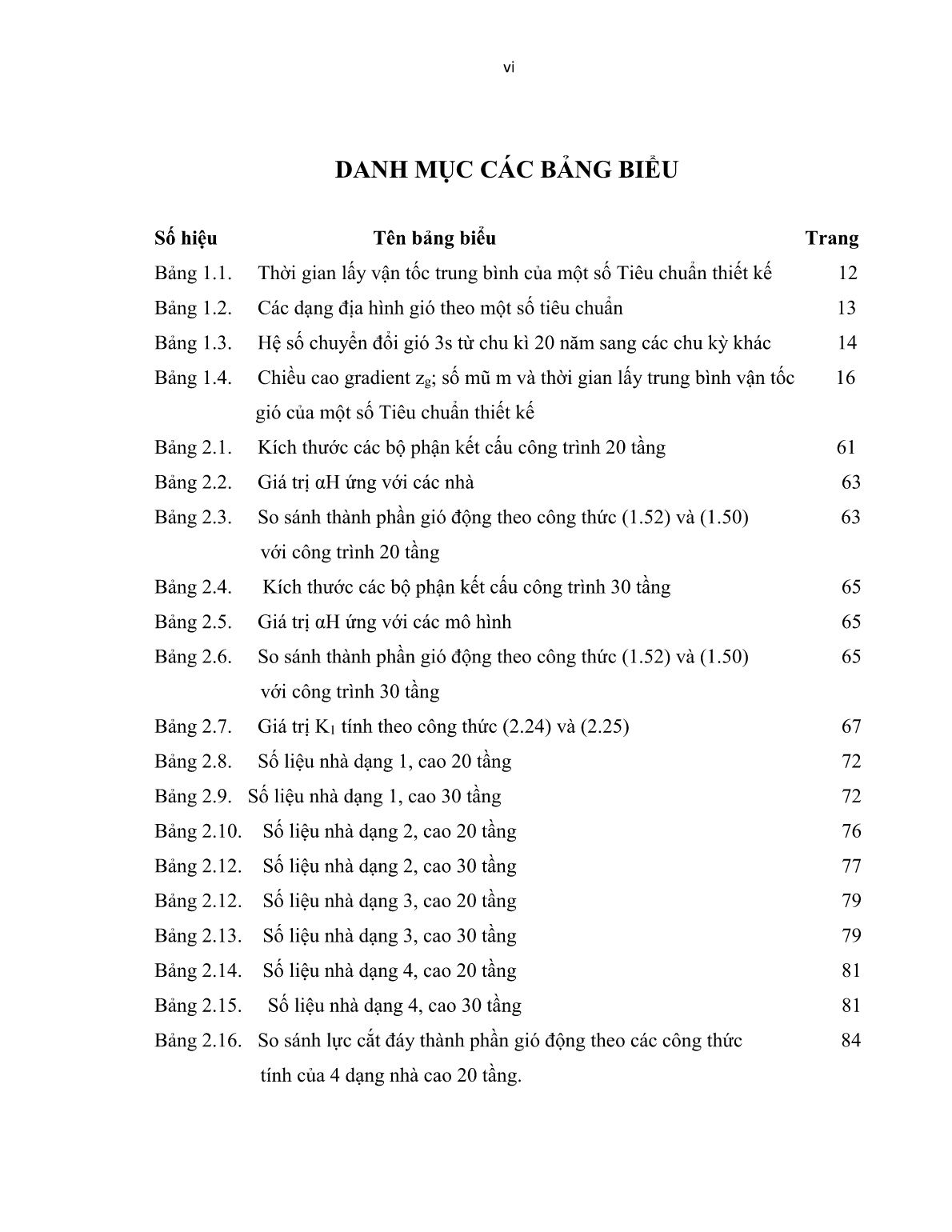
Trang 8
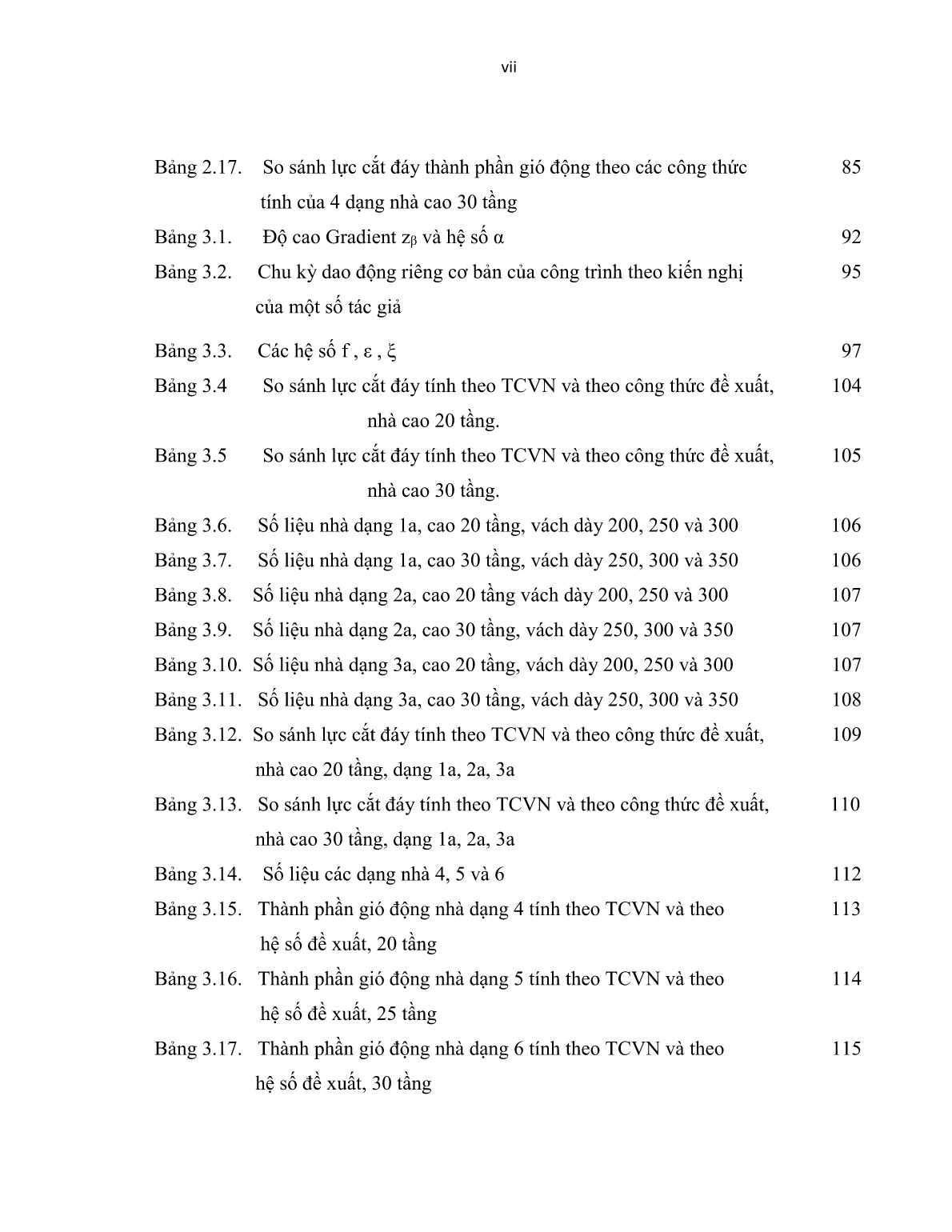
Trang 9
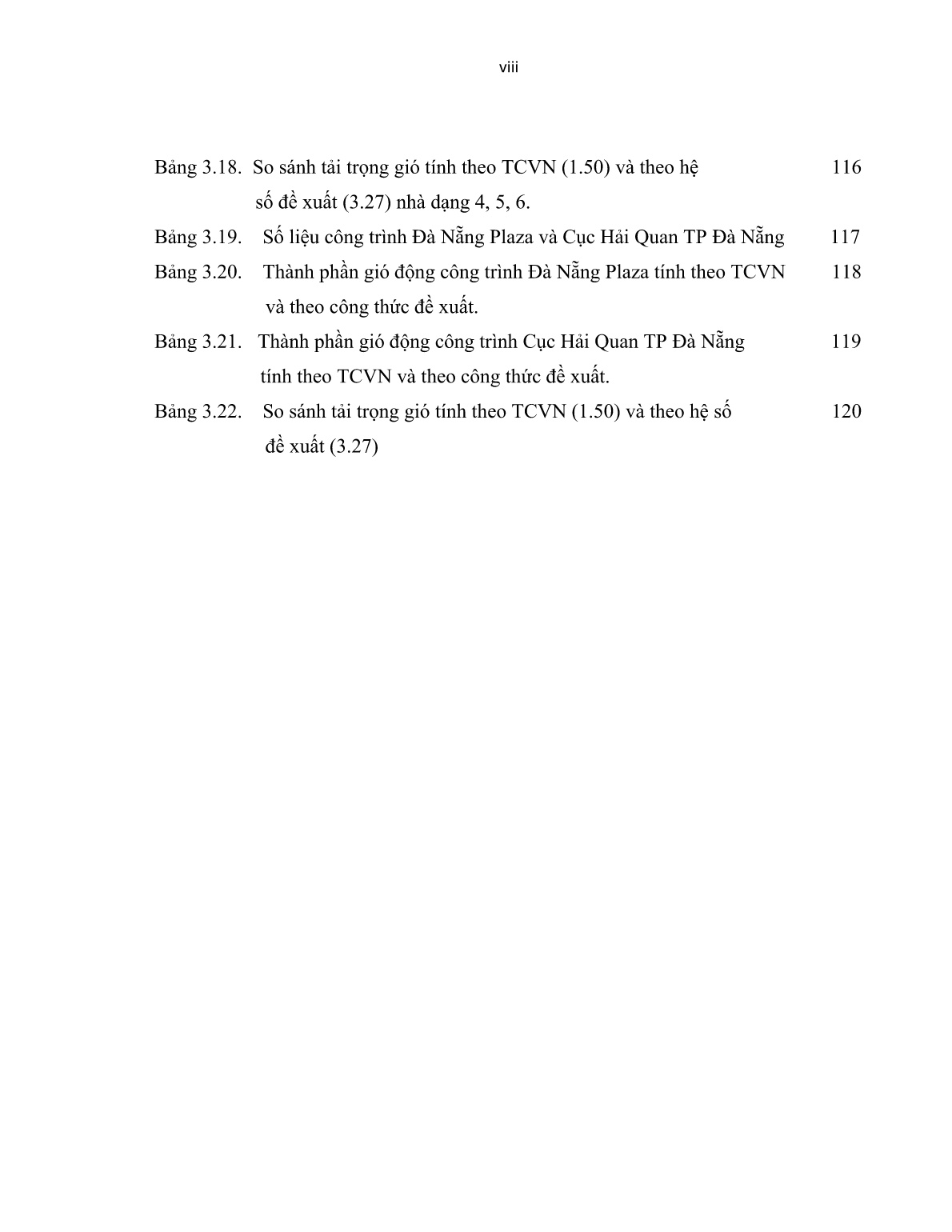
Trang 10
Tải về để xem bản đầy đủ
Bạn đang xem 10 trang mẫu của tài liệu "Luận án Nghiên cứu xác định tải trọng gió lên nhà cao tầng có kết cấu khung giằng", để tải tài liệu gốc về máy hãy click vào nút Download ở trên.
Tóm tắt nội dung tài liệu: Luận án Nghiên cứu xác định tải trọng gió lên nhà cao tầng có kết cấu khung giằng
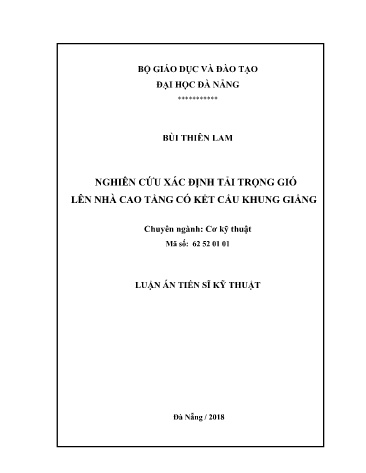
n động của tải trọng gió theo TCVN 2737-1995. NXB Xây Dựng Hà Nội, 1999. 15. Triệu Tây An, Hỏi-Đáp Thiết Kế và Thi Công Kết Cấu Nhà Cao Tầng, Tập 1, NXB Xây Dựng, 1996. TIẾNG ANH 16. American Society of Civil Engineers (ASCE), ASCE/SEI 7-16 (2016), Minimum Design Loads for Buildings and Other Structures, New York. 17. Ahsan Kareem, Yin Zhou, “Gust Loading Factors, Past, Present and Future”, Journal of Wind Engineering and Industrial Aerodynamics 91 (2003) pp 1301– 1328 18. Balendra T., Tan C.L., and Ma Z. (2003), “Design of Tall Residential Building In Singapore For Wind Effects”, Wind and Structures Vol.6, pp 221-248 19. Bryan Stafford Smith, Alex Coull (1991), Tall Building Structures: Analysis and Design, Published by John Wiley & Son, Inc, New York. 20. Cermak J. E. (1977), “Wind Tunnel Testing of Structures”, Journal Engineering Mechanics., ASCE 103 (EM6) pp 1125-1140. 21. Counihan J. (1969), “An improved method of simulating an atmospheric boundary layer in a wind tunnel”, Journal Fluid Mechanics, vol. 3, 1969, pp 197-214. 22. Dae Kun Kwon, Ahsan Kareem (2013), “Comparative study of major international wind codes and stadards for wind effects on tall buildings”, Engineering Structures 51, pp 23-35. 23. Davenport A.G. (1961a), “The Application of Statistical Concepts to the Wind Loading of Structures”, Proc. ICE London, 19, pp 449-472 128 24. Davenport A.G. (1967), “Gust Loading Factors”, Journal of the Structure Division, 93 (ST3), pp 11-34. 25. Davenport A.G. (1993b), “How Can We Simplify and Generalize Wind Loads”, Proc. III Asia-Pacific Sympo. on Wind Engrg., Hong Kong, pP 15-26. 26. Davenport A.G. (1998), What Makes A Structure Wind Sensitive, Wind Effects on Buildings and Structures. Riera & Davenport (eds-1998) Balkema., Rotterdam, pp 1-13. 27. Davenport A. G. and Isyumov N. (1967), “The Application of the Boundary Layer Wind Tunnel to the Prediction of Wind Loading”, Proc. IIInt. Conf. on Wind Engrg., Canada, Ottawa, pp 201-230. 28. Davenport A.G. (1999), Wind Engineering into the 21st Century, Larsen, Larose & Livesey (eds-1999) Balkema, pp 3-13. 29. Eurocode 1 (2005) Actions on Structures, Part 1-4, Wind Actions, London, Bristish Standards Institute 30. Fujimoto M., Ohkuma T. and Amano T. (1975), “Dynamic Model Test of a High Rise Building in Wind Tunnel and in Natural Winds”, Proc. IV Int. Conf. on Wind Engrg., Heathrow, UK, pp 297-308. 31. Harris R. I. (1963), “The Response of Structures to Gusts”, Proc. ICWE 1, National Physical Labolatory Teddington, U.K. 32. Holmes J. (2003), “Emerging Issues in Wind Engineering”, Proc. XI Int. Conf. on Wind Engrg, pp 49-64. 33. Holmes J. D and R. E. Lewis (1987), “Optimization of dynamic-pressure- measurement systems. II. Parallel tube-manifold systems”. Journal of Wind Engineering and Industrial Aerodynamics, Volume 25, Issue 3, 1987, pp 249- 273. 34. Holmes J.D. and R.E. Lewis (1987), “Optimization of dynamic-pressure- measurement systems. I. Single point measurements”. Journal of Wind Engineering and Industrial Aerodynamics, Volume 25, Issue 3, 1987, pp 275- 290 129 35. Isyumov N., Steckley A., Amin N., and Fatehi H. (1990), “Effect of Orientation of the Principal Axis of Stiffness on the Dynamic Response of Slender Square Buildings”, Journal of Wind Engineering and Industrial Aerodynamics, Vol 36, part 2, pp 769-778. 36. Japan Standard AIJ 2004, Recommendations for Loads on Buildings – Wind Loads, Tokyo. 37. Kareem A. (2003), “A Tribute to Jack E. Cermak- Wind Effects on Structures: A Reflection on the Past and Outlook for the Future”, Proc. XI Int. Conf. on Wind Engrg, pp 1-28. 38. Katagiri J., Marukawa H., Fujii K., Nakamura O., and Katsumura A. (1995), “Evaluation of Wind Responses of A Building Gained From Wind Tunnel Tests”, Proc. IX Int. Conf. on Wind Engrg., N. Delhi, India, pp 1408-1419. 39. Kijewski T. and Kareem A. (1999), “Analysis of Full-Scale Data from a Tall Building in Boston: Damping Estimates”, Wind Engineering into the 21st Century, Larsen, Larose &Livesey (eds-1999) Balkema, Rotterdam, pp 679- 684. 40. Kijewskit T. and Kareem A. (1998), “Dynamic wind effects: a comparative study of provisions in codes and standards with wind tunnel data”, Wind and Structures, vol. 1 (no.1), 1998, pp 77-109. 41. Liepmann H. W. (1952), “On The Application of Statistical Concepts to the Buffeting Problem”, J. Aero. Sciences, 19 (12), pp 793-402. 42. Mitra D. and Kasperski M. (2006), “Determination of Appropriate Geometric Scale Ratio for Simulated Boundary Layer in Wind Tunnel”, Third National Conference on Wind Engineering, Department of Mechanical Engineering Jadavpur University, Kolkata, India, January 5-7, 2006, pp 104-112. 43. Nguyen Kien Cuong (2009), A study of aerodynamic wind loads on tall buildings using wind tunnel tests and numerical simulations, Doctoral thesis, 2009. 130 44. Nikolai A. Popov (2000), “The wind load codification in Russia and somes estimates of a gust load accuracy provided by different codes”, Journal of Wind Engineering and Industrial Aerodynamics, 88 (2000), pp 171-181. 45. Parera M.D.A.E.S. (1978), “A Wind Tunnel Study of the Interaction between Alongwind and Acrosswind Vibrations of Tall Slender Structures”, J.W.E& I.A., 3, pp 315-341. 46. Rachel Bashor and Ahsan Kareem (2009), “Comparative Study of Major International Standards”, The Seventh Asia-Pacific Conference on Wind Engineering, November 8-12, 2009, Taipei, Taiwan. 47. Rathbun J. C. (1940), “Wind Forces on a Tall Building”, Trans. of ASCE, vol 140, pp 1-82. 48. Russian Ministry of Construction, SNiP 2.01.07-85*, Wind Loads and Effects, Moscow, 2011. 49. Simiu E. (1973a). “Gust Factors and Alongwind Pressures Correlations”, J. Struct. Engrg., ASCE, 99 (ST4), pp 773-783. 50. Simiu E. (1976), “Equivalent Static Wind Loads for Tall Buildings Design”, J. Struct. Engrg., ASCE, 102 (ST4), pp 719-738. 51. Simiu E. (1980), “Revised Procedure for Estimating Alongwind Response”, J. Struct. Engrg., ASCE, 106 (ST1), pp 1-10. 52. Solari G. (1982), “Alongwind Response Estimation: Closed Form Solution”, Journal of the Structural Division, 1982, Vol. 108, Issue 1, pp 225-244 53. Solari G. (1985), “An Alternative Procedure for Calculating the Dynamic Alongwind Response of Structures”, Proc. VUS National Conference on W.E., TTU, USA, 1B, pp 5-32. 54. Solari G. (1987), “Dynamic Alongwind Response of Structures by Response Spectrum Technique”, High Winds & Building Codes, WERC/NSF Sympo. On W.E., USA, pp 445-452. 55. Solari G. (1988), “Equivalent Wind Spectrum Technique-Theory and Application”, J. Struct. Engrg., ASCE, 114 (ST6), 1303-1323. 131 56. Standard Association of Australia AS/NZS 1170.2:2011: Part 2: Wind Forces, Sydney. 57. Steckley A., Accardo M., GambleS.L. and Irwin P.A., Williams R.D. and Irwin I., Guelph, O.C. (1992). “The Use of Integrated Pressures to Determine Overall Wind- Induced Response”, J.W.E. &I.A., (41-44) 1023-1034. 58. Tamura, Y., A. Kareem, G. Solari, K. C. S. Kwok, J. D. Holmes and W. H. Melbourne (2005), “Aspects of the Dynamic Wind-Induced Response of Structures and Codification”, Wind and Structures 89 (4): pp 251-268. 59. Vellozzi J. and Cohen E. (1968), “Gust Response Factors”, J. Struct. Engrg, ASCE 94 (ST6), pp 1295-1313. 60. Vickery B.J. (1971). “On The Reliability of Transactions. Gust Loading Factors”, Civil Engrg Transactions, IEA, CE13 (1), pp 1-9. 61. Whitbread R. E. (1963), “Model Simulation of Wind Effects on Structures”, Proc. IInt. Conf. on Wind Engrg., NPL, England, I, pp 284-302. 62. Yang J.N. and Lin Y.K. (1981). “Alongwind Motion of Multi –Story Buildings”, J. Engrg. Mech., ASCE, 107 (EM2), pp 295-307. 63. Yasushi Uematsu (2014), “Advances in wind resistant design and win resistance evaluation in Japan”, Steel Construction Today and Tomorrow, No 43 12- 2014, pp 1-3. 64. Yip D.Y.N., Flay R.G.J. (1995), “A New Force Balance Data Analysis Method for Wind Response Predictions of Tall Buildings”, J.W.E. &I.A., 457-471. 65. Yoon S.W., Ju Y.K., Kim S.B. (2003), “Vibration Measurements of Tall Buildings in Korea”, Proc. XI Int. Conf. on Wind Engrg, pp 527-534. 66. Yukio Tamurab, Ning Lina, Chris Letchforda, Bo Liangc and Osamu Nakamurad, “Local wind forces acting on rectangular prisms”, Proceedings of 14th National Symposium on Wind engineering, 4-6 December 1996, Japan Association for Wind engineering, Tokyo, pp 263-268. 132 67. Zhou Y., Kijewski T. and Kareem A. (2002), “Along-Wind Load Effects on Tall Buildings: Comparative Study of Major International Codes and Standards”. Journal Struct. Engrg I., pp 788-796. 133 PHỤ LỤC Phụ Lục 2.1a. Bảng tính giá trị K1 khi chịu tải trọng ngang phân bố đều H z K 1 H 0.00 0.50 1.00 1.50 2.00 3.00 4.00 6.00 0.00 0.000 0.000 0.000 0.000 0.000 0.000 0.000 0.000 0.05 0.006 0.005 0.004 0.003 0.003 0.002 0.002 0.001 0.10 0.017 0.018 0.015 0.013 0.011 0.008 0.006 0.004 0.15 0.042 0.038 0.033 0.027 0.023 0.017 0.013 0.009 0.20 0.069 0.065 0.056 0.046 0.038 0.028 0.022 0.014 0.25 0.105 0.098 0.083 0.068 0.056 0.041 0.031 0.020 0.30 0.148 0.137 0.115 0.094 0.077 0.054 0.041 0.026 0.35 0.192 0.179 0.150 0.122 0.099 0.069 0.051 0.032 0.40 0.243 0.226 0.188 0.151 0.122 0.084 0.062 0.038 0.45 0.299 0.275 0.228 0.182 0.146 0.099 0.072 0.043 0.50 0.354 0.328 0.270 0.214 0.171 0.114 0.082 0.048 0.55 0.412 0.382 0.314 0.247 0.195 0.129 0.092 0.053 0.60 0.476 0.438 0.358 0.280 0.220 0.144 0.101 0.058 0.65 0.538 0.495 0.403 0.314 0.244 0.157 0.110 0.062 0.70 0.604 0.554 0.449 0.347 0.268 0.171 0.118 0.066 0.75 0.668 0.613 0.495 0.380 0.292 0.183 0.125 0.069 0.80 0.734 0.672 0.540 0.413 0.315 0.195 0.132 0.072 0.85 0.800 0.732 0.586 0.445 0.337 0.207 0.138 0.074 0.90 0.865 0.792 0.632 0.477 0.360 0.218 0.144 0.076 0.95 0.933 0.852 0.677 0.509 0.381 0.228 0.150 0.078 1.00 0.999 0.912 0.723 0.541 0.403 0.239 0.155 0.080 134 Phụ Lục 2.1b. Bảng tính giá trị K1 khi chịu tải trọng ngang phân bố tam giác z H K 1 H 0.00 0.50 1.00 1.50 2.00 3.00 4.00 6.00 0.00 0.000 0.000 0.000 0.000 0.000 0.000 0.000 0.000 0.05 0.004 0.004 0.004 0.003 0.002 0.002 0.001 0.001 0.10 0.017 0.016 0.014 0.011 0.009 0.007 0.005 0.004 0.15 0.038 0.035 0.030 0.024 0.020 0.014 0.011 0.007 0.20 0.066 0.061 0.051 0.042 0.034 0.024 0.018 0.012 0.25 0.100 0.093 0.077 0.063 0.051 0.035 0.026 0.017 0.30 0.140 0.129 0.108 0.086 0.070 0.048 0.036 0.022 0.35 0.185 0.171 0.142 0.113 0.091 0.062 0.045 0.027 0.40 0.233 0.216 0.179 0.142 0.113 0.076 0.055 0.033 0.45 0.287 0.265 0.218 0.172 0.136 0.091 0.065 0.038 0.50 0.344 0.317 0.260 0.204 0.160 0.105 0.075 0.043 0.55 0.401 0.372 0.303 0.237 0.185 0.120 0.084 0.048 0.60 0.465 0.428 0.348 0.270 0.210 0.135 0.094 0.052 0.65 0.530 0.486 0.394 0.304 0.234 0.149 0.102 0.057 0.70 0.595 0.545 0.440 0.337 0.259 0.162 0.111 0.061 0.75 0.663 0.605 0.487 0.371 0.283 0.176 0.119 0.064 0.80 0.729 0.666 0.533 0.405 0.307 0.188 0.126 0.067 0.85 0.795 0.727 0.580 0.439 0.331 0.200 0.133 0.070 0.90 0.862 0.788 0.627 0.472 0.354 0.212 0.139 0.073 0.95 0.931 0.850 0.674 0.505 0.377 0.223 0.145 0.075 1.00 0.999 0.911 0.721 0.538 0.399 0.234 0.151 0.077 135 PHỤ LỤC 2.2a- BẢNG XÁC ĐỊNH GIÁ TRỊ THÀNH PHẦN ĐỘNG CỦA TẢI TRỌNG GIÓ THEO 2 CÔNG THỨC - CT 20 TẦNG - MÔ HÌNH 1 2 WO = 0.950 c = 1.4 εi = 0.063 E = 3.00E+07 kN/m α = 0.09 B = 40.0 ξi = 1.723 αH = 0.5450 γ = 1.2 ν = 0.638 Ψi = 0.115 T= 1.764 β = 1.0 f i = 0.567 Wph = 85.116 Áp lực Gió động (CT1.50) Gió động (CT1.52) Cao độ Hệ số Diện tích Kh.lượng Chuyển vị H.số ALĐ 2 Tầng WFj yji.WFj yji .Mj tt tt tt z k(z) Wj Wj Sj Mj tỷ đối yji ζj Wp(ji) Wp (ji) z/H Wp (ji) 1 3.6 0.832 1.107 1.328 144.0 914.24 0.00779 0.533 54.17 0.422 0.056 1.406 1.69 0.050 10.27 2 7.2 0.943 1.254 1.504 144.0 914.24 0.02434 0.501 57.65 1.403 0.542 4.392 5.27 0.100 20.53 3 10.8 1.014 1.349 1.618 144.0 914.24 0.04859 0.483 59.80 2.905 2.158 8.768 10.52 0.150 30.80 4 14.4 1.068 1.420 1.704 144.0 914.24 0.07980 0.470 61.37 4.897 5.822 14.399 17.28 0.200 41.06 5 18.0 1.112 1.478 1.774 144.0 914.24 0.11716 0.461 62.61 7.336 12.550 21.142 25.37 0.250 51.33 6 21.6 1.149 1.528 1.833 144.0 914.24 0.16003 0.453 63.65 10.185 23.413 28.877 34.65 0.300 61.60 7 25.2 1.181 1.571 1.885 144.0 914.24 0.20760 0.447 64.54 13.398 39.403 37.462 44.95 0.350 71.86 8 28.8 1.210 1.609 1.931 144.0 914.24 0.25916 0.442 65.32 16.927 61.404 46.765 56.12 0.400 82.13 9 32.4 1.236 1.643 1.972 144.0 914.24 0.31419 0.437 66.01 20.740 90.251 56.696 68.04 0.450 92.39 10 36.0 1.259 1.675 2.010 144.0 914.24 0.37198 0.433 66.64 24.789 126.500 67.123 80.55 0.500 102.66 11 39.6 1.281 1.704 2.045 144.0 914.24 0.43201 0.429 67.21 29.037 170.624 77.955 93.55 0.550 112.92 12 43.2 1.301 1.731 2.077 144.0 914.24 0.49363 0.426 67.74 33.440 222.771 89.075 106.89 0.600 123.19 13 46.8 1.320 1.756 2.107 144.0 914.24 0.55648 0.423 68.23 37.970 283.114 100.417 120.50 0.650 133.46 14 50.4 1.338 1.779 2.135 144.0 914.24 0.62006 0.420 68.69 42.591 351.500 111.889 134.27 0.700 143.72 15 54.0 1.355 1.802 2.162 144.0 914.24 0.68392 0.418 69.12 47.271 427.638 123.414 148.10 0.750 153.99 16 57.6 1.370 1.823 2.187 144.0 914.24 0.74801 0.415 69.52 52.001 511.533 134.978 161.97 0.800 164.25 17 61.2 1.386 1.843 2.211 144.0 914.24 0.81173 0.413 69.90 56.740 602.399 146.477 175.77 0.850 174.52 18 64.8 1.400 1.862 2.234 144.0 914.24 0.87473 0.411 70.26 61.459 699.531 157.845 189.41 0.900 184.79 19 68.4 1.414 1.880 2.256 144.0 914.24 0.93773 0.409 70.60 66.207 803.919 169.213 203.06 0.950 195.05 20 72.0 1.427 1.897 2.277 144.0 808.24 1.00000 0.407 70.93 70.930 808.240 159.528 191.43 1.000 205.32 Σ 600.649 5243.366 1557.820 1869.38 2155.83 Ghi chú: hệ đơn vị sử dụng là kN-m -15.32% 136 PHỤ LỤC 2.2b - BẢNG XÁC ĐỊNH GIÁ TRỊ THÀNH PHẦN ĐỘNG CỦA TẢI TRỌNG GIÓ THEO 2 CÔNG THỨC - CT 20 TẦNG - MÔ HÌNH 2 2 WO = 0.950 c = 1.4 εi = 0.067 E = 3.00E+07 kN/m α = 0.09 B = 40.0 ξi = 1.729 αH = 1.0140 γ = 1.2 ν = 0.638 Ψi = 0.113 T= 1.879 β = 1.0 f i = 0.532 Wph = 85.116 Cao độ Hệ số Áp lực Diện tích Kh.lượng Chuyển vị H.số ALĐ 2 Gió động (CT1.50) Gió động (CT1.52) Tầng tt WFj yji.WFj yji .Mj tt tt z k(z) Wj Wj Sj Mj tỷ đối yji ζj Wp(ji) Wp (ji) z/H Wp (ji) 1 3.6 0.832 1.107 1.328 144.0 909.96 0.0100 0.533 54.17 0.540 0.091 1.770 2.12 0.050 10.3 2 7.2 0.943 1.254 1.504 144.0 909.96 0.0297 0.501 57.65 1.714 0.804 5.273 6.33 0.100 20.6 3 10.8 1.014 1.349 1.618 144.0 909.96 0.0577 0.483 59.80 3.448 3.025 10.229 12.27 0.150 30.9 4 14.4 1.068 1.420 1.704 144.0 909.96 0.0928 0.470 61.37 5.693 7.832 16.458 19.75 0.200 41.2 5 18.0 1.112 1.478 1.774 144.0 909.96 0.1341 0.461 62.61 8.398 16.371 23.794 28.55 0.250 51.5 6 21.6 1.149 1.528 1.833 144.0 909.96 0.1807 0.453 63.65 11.501 29.713 32.056 38.47 0.300 61.8 7 25.2 1.181 1.571 1.885 144.0 909.96 0.2316 0.447 64.54 14.946 48.807 41.085 49.30 0.350 72.1 8 28.8 1.210 1.609 1.931 144.0 909.96 0.2860 0.442 65.32 18.680 74.426 50.735 60.88 0.400 82.4 9 32.4 1.236 1.643 1.972 144.0 909.96 0.3432 0.437 66.01 22.656 107.193 60.887 73.06 0.450 92.7 10 36.0 1.259 1.675 2.010 144.0 909.96 0.4025 0.433 66.64 26.820 147.389 71.396 85.68 0.500 103.0 11 39.6 1.281 1.704 2.045 144.0 909.96 0.4632 0.429 67.21 31.133 195.227 82.169 98.60 0.550 113.3 12 43.2 1.301 1.731 2.077 144.0 909.96 0.5247 0.426 67.74 35.542 250.487 93.075 111.69 0.600 123.6 13 46.8 1.320 1.756 2.107 144.0 909.96 0.5864 0.423 68.23 40.014 312.944 104.034 124.84 0.650 133.9 14 50.4 1.338 1.779 2.135 144.0 909.96 0.6481 0.420 68.69 44.520 382.258 114.979 137.97 0.700 144.2 15 54.0 1.355 1.802 2.162 144.0 909.96 0.7093 0.418 69.12 49.026 457.825 125.832 151.00 0.750 154.5 16 57.6 1.370 1.823 2.187 144.0 909.96 0.7697 0.415 69.52 53.513 539.160 136.552 163.86 0.800 164.8 17 61.2 1.386 1.843 2.211 144.0 909.96 0.8294 0.413 69.90 57.972 625.904 147.128 176.55 0.850 175.1 18 64.8 1.400 1.862 2.234 144.0 909.96 0.8875 0.411 70.26 62.355 716.706 157.438 188.93 0.900 185.4 19 68.4 1.414 1.880 2.256 144.0 909.96 0.9441 0.409 70.60 66.658 811.093 167.485 200.98 0.950 195.7 20 72.0 1.427 1.897 2.277 144.0 825.16 1.0000 0.407 70.93 70.930 825.160 160.867 193.04 1.000 206.0 Σ 626.060 5552.413 1603.241 1923.89 2163.34 Ghi chú: hệ đơn vị sử dụng là kN-m -12.45% 137 PHỤ LỤC 2.2c - BẢNG XÁC ĐỊNH GIÁ TRỊ THÀNH PHẦN ĐỘNG CỦA TẢI TRỌNG GIÓ THEO 2 CÔNG THỨC - CT 20 TẦNG - MÔ HÌNH 3 2 WO = 0.950 c = 1.4 εi = 0.069 E = 3.00E+07 kN/m α = 0.09 B = 40.0 ξi = 1.731 αH = 1.5347 γ = 1.2 ν = 0.638 Ψi = 0.096 T= 1.916 β = 1.0 f i = 0.522 Wph = 85.116 Cao độ Hệ số Áp lực Diện tích Kh.lượng Chuyển vị H.số ALĐ 2 Gió động (CT1.50) Gió động (1.52) Tầng tt WFj yji.WFj yji .Mj tt tt z k(z) Wj Wj Sj Mj tỷ đối yji ζj Wp(ji) Wp (ji) z/H Wp (ji) 1 3.6 0.832 1.107 1.328 144.0 1041.54 0.013 0.533 54.17 0.691 0.169 2.209 2.65 0.050 10.3 2 7.2 0.943 1.254 1.504 144.0 1041.54 0.038 0.501 57.65 2.211 1.532 6.645 7.97 0.100 20.6 3 10.8 1.014 1.349 1.618 144.0 1041.54 0.073 0.483 59.80 4.361 5.541 12.635 15.16 0.150 30.9 4 14.4 1.068 1.420 1.704 144.0 1041.54 0.115 0.470 61.37 7.058 13.777 19.925 23.91 0.200 41.3 5 18.0 1.112 1.478 1.774 144.0 1041.54 0.163 0.461 62.61 10.214 27.719 28.262 33.91 0.250 51.6 6 21.6 1.149 1.528 1.833 144.0 1041.54 0.216 0.453 63.65 13.748 48.600 37.422 44.91 0.300 61.9 7 25.2 1.181 1.571 1.885 144.0 1041.54 0.273 0.447 64.54 17.590 77.375 47.218 56.66 0.350 72.2 8 28.8 1.210 1.609 1.931 144.0 1041.54 0.332 0.442 65.32 21.665 114.591 57.462 68.95 0.400 82.5 9 32.4 1.236 1.643 1.972 144.0 1041.54 0.392 0.437 66.01 25.904 160.382 67.981 81.58 0.450 92.8 10 36.0 1.259 1.675 2.010 144.0 1041.54 0.454 0.433 66.64 30.252 214.642 78.644 94.37 0.500 103.1 11 39.6 1.281 1.704 2.045 144.0 1041.54 0.516 0.429 67.21 34.656 276.883 89.322 107.19 0.550 113.4 12 43.2 1.301 1.731 2.077 144.0 1041.54 0.577 0.426 67.74 39.064 346.335 99.898 119.88 0.600 123.8 13 46.8 1.320 1.756 2.107 144.0 1041.54 0.637 0.423 68.23 43.432 422.002 110.272 132.33 0.650 134.1 14 50.4 1.338 1.779 2.135 144.0 1041.54 0.695 0.420 68.69 47.733 502.963 120.386 144.46 0.700 144.4 15 54.0 1.355 1.802 2.162 144.0 1041.54 0.751 0.418 69.12 51.927 587.888 130.154 156.18 0.750 154.7 16 57.6 1.370 1.823 2.187 144.0 1041.54 0.806 0.415 69.52 55.999 675.790 139.545 167.45 0.800 165.0 17 61.2 1.386 1.843 2.211 144.0 1041.54 0.857 0.413 69.90 59.931 765.639 148.532 178.24 0.850 175.3 18 64.8 1.400 1.862 2.234 144.0 1041.54 0.907 0.411 70.26 63.756 857.621 157.202 188.64 0.900 185.6 19 68.4 1.414 1.880 2.256 144.0 1041.54 0.955 0.409 70.60 67.424 949.836 165.437 198.52 0.950 196.0 20 72.0 1.427 1.897 2.277 144.0 908.28 1.000 0.407 70.93 70.930 908.280 151.074 181.29 1.000 206.3 Σ 668.546 6957.564 1670.226 2004.27 2165.84 Ghi chú: hệ đơn vị sử dụng là kN-m -8.06% 138 PHỤ LỤC 2.2d - BẢNG XÁC ĐỊNH GIÁ TRỊ THÀNH PHẦN ĐỘNG CỦA TẢI TRỌNG GIÓ THEO 2 CÔNG THỨC - CT 20 TẦNG- MÔ HÌNH 4 2 WO = 0.950 c = 1.4 εi = 0.064 E = 3.00E+07 kN/m α = 0.09 B = 40.0 ξi = 1.721 αH = 1.9170 γ = 1.2 ν = 0.638 Ψi = 0.093 T= 1.783 β = 1.0 f i = 0.561 Wph = 85.116 Cao độ Hệ số Áp lực Diện tích Kh.lượng Chuyển vị H.số ALĐ 2 Gió động (CT1.50) Gió động (CT1.52) Tầng tt WFj yji.WFj yji .Mj tt tt z k(z) Wj Wj Sj Mj tỷ đối yji ζj Wp(ji) Wp (ji) z/H Wp (ji) 1 3.6 0.832 1.107 1.328 144.0 1068.68 0.0144 0.533 54.17 0.778 0.220 2.448 2.94 0.050 10.3 2 7.2 0.943 1.254 1.504 144.0 1068.68 0.0423 0.501 57.65 2.437 1.910 7.207 8.65 0.100 20.5 3 10.8 1.014 1.349 1.618 144.0 1068.68 0.0793 0.483 59.80 4.739 6.712 13.512 16.21 0.150 30.8
File đính kèm:
 luan_an_nghien_cuu_xac_dinh_tai_trong_gio_len_nha_cao_tang_c.pdf
luan_an_nghien_cuu_xac_dinh_tai_trong_gio_len_nha_cao_tang_c.pdf DongGopMoiCuaLuanAn(TA)-buithienlam.pdf
DongGopMoiCuaLuanAn(TA)-buithienlam.pdf DongGopMoiCuaLuanAn(TV)-buithienlam.pdf
DongGopMoiCuaLuanAn(TV)-buithienlam.pdf TomTatLuanAn(TA)-buithienlam.pdf
TomTatLuanAn(TA)-buithienlam.pdf TomTatLuanAn(TV)-buithienlam.pdf
TomTatLuanAn(TV)-buithienlam.pdf TrichYeuLuanAn(TA)-buithienlam.pdf
TrichYeuLuanAn(TA)-buithienlam.pdf TrichYeuLuanAn(TV)-buithienlam.pdf
TrichYeuLuanAn(TV)-buithienlam.pdf

